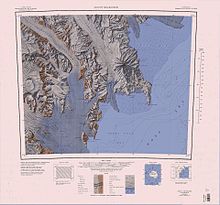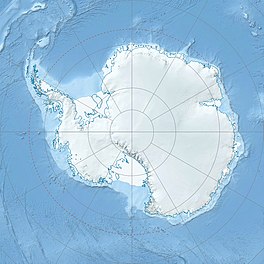Larsen Glacier
| Location | Victoria Land |
|---|---|
| Coordinates | 75°6′S 162°28′E / 75.100°S 162.467°E |
| Terminus | Ross Sea |
The Larsen Glacier (75°6′S 162°28′E / 75.100°S 162.467°E) is a glacier flowing southeast from Reeves Névé, through the Prince Albert Mountains and entering the Ross Sea just south of Mount Crummer in Victoria Land, Antarctica.[1]
Exploration and naming
The Larsen Glacier was discovered by the South Magnetic Party of Ernest Shackleton's British Antarctic Expedition, 1907–09, who followed its course on their way to the plateau area beyond. They named it Larsen Glacier because it flowed past the foot of Mount Larsen, which was constantly in view as they ascended the course of the glacier.[1]
Location
The Larsen Glacier forms to the southeast of Reeves Névé between the Reed Nunataks and Tomovick Nunatak.[2] It flows southeast past Widowmaker Pass and Mount Gerlache in the Prince Albert Mountains.[3] It continues past the mouth of Backstairs Passage Glacier and Mount Crummer to the north, and Fleming Head to the south, to enter Relief Inlet in the Terra Nova Bay.[4]
Features



Features of the glacier and the terrain it flows through include:
Reed Nunataks
74°49′S 161°58′E / 74.817°S 161.967°E. A cluster of nunataks that form a divide between the upper portions of the Reeves Glacier and Larsen Glacier, 6 nautical miles (11 km; 6.9 mi) west of Hansen Nunatak. Mapped by USGS from surveys and United States Navy aerial photographs, 1956-62. Named by US-ACAN for David Reed, USGS Topographic Engineer at McMurdo Station, 1964-65.[5]
Tomovick Nunatak
74°59′S 161°51′E / 74.983°S 161.850°E. A nunatak along the southern side of the upper portion of Larsen Glacier, 9 nautical miles (17 km; 10 mi) west of Mount Gerlache. Mapped by the United States Geological Survey (USGS) from surveys and United States Navy air photos, 1956-62. Named by the United States Advisory Committee on Antarctic Names (US-ACAN) for Donald S. Tomovick, United States Navy, utilitiesman at South Pole Station in 1966.[6]
Mount Gerlache
74°59′S 162°26′E / 74.983°S 162.433°E. A prominent mountain, 980 metres (3,220 ft) high, standing on the northeast side of Larsen Glacier between Widowmaker Pass and Backstairs Passage Glacier. Discovered by the British National Antarctic Expedition, 1901-04, and named for Lieutenant Adrien de Gerlache.[7]
Backstairs Passage Glacier
75°02′S 162°36′E / 75.033°S 162.600°E. A glacier about 2 nautical miles (3.7 km; 2.3 mi) long, draining east along the north side of Mount Crummer to the Ross Sea. The Magnetic Pole Party, led by T.W. Edgeworth David, of the British Antarctic Expedition, 1907-09, ascended this glacier from the Ross Sea, then continued the ascent via Larsen Glacier to the plateau of Victoria Land. So named by David's party because of the circuitous route to get to Larsen Glacier.[8]
Fleming Head
75°10′S 162°38′E / 75.167°S 162.633°E. A prominent rock headland on the coast of Victoria Land, marking the south side of the terminus of Larsen Glacier where it enters the Ross Sea. Mapped by USGS from surveys and United States Navy air photos, 1957-62. Named by US-ACAN for John P. Fleming, Senior Chief Construction Electrician, United States Navy, a member of the McMurdo Station winter party, 1962 and 1966.[9]
References
- ^ a b Alberts 1995, p. 419.
- ^ Reeves Névé USGS.
- ^ Mount Melbourne USGS.
- ^ Relief Inlet USGS.
- ^ Alberts 1995, p. 609.
- ^ Alberts 1995, p. 751.
- ^ Alberts 1995, p. 275.
- ^ Alberts 1995, p. 38.
- ^ Alberts 1995, p. 245.
Sources
- Alberts, Fred G., ed. (1995), Geographic Names of the Antarctic (PDF) (2 ed.), United States Board on Geographic Names, retrieved 25 January 2024
 This article incorporates public domain material from websites or documents of the United States Board on Geographic Names.
This article incorporates public domain material from websites or documents of the United States Board on Geographic Names. - Mount Melbourne, USGS: United States Geological Survey, retrieved 27 January 2024
- Reeves Névé, USGS: United States Geological Survey, retrieved 27 January 2024
- Relief Inlet, USGS: United States Geological Survey, retrieved 27 January 2024
![]() This article incorporates public domain material from websites or documents of the United States Geological Survey.
This article incorporates public domain material from websites or documents of the United States Geological Survey.

